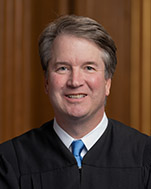An Outsider's Guide to the SCOTUS Justices (pt. 3)
Brett M. Kavanaugh, Associate Justice
Justice Brett Kavanaugh received a B.A. from Yale College in 1987 and a J.D. from Yale Law School in 1990. He clerked for two judges on the U.S. Court of Appeals circuits and for Justice Anthony M. Kennedy of the U.S. Supreme Court. He was an attorney in the Office of the Solicitor General of the United States and an Associate Counsel in the Office of Independent Counsel. He had brief stints in a DC private law firm. From 2001 to 2003, he was Associate Counsel and then Senior Associate Counsel to President George W. Bush before being the Assistant to the President and Staff Secretary. He was appointed a Judge of the United States Court of Appeals for the District of Columbia Circuit in 2006. President Donald J. Trump nominated him to replace the retiring Justice Kennedy.
Amy Coney Barrett, Associate Justice
Justice Amy Coney Barrett received a B.A. from Rhodes College in 1994 and a J.D. from Notre Dame Law School in 1997. She’s the only one on the court right now not to get her JD from Harvard or Yale. She clerked for Judge Laurence H. Silberman of the U.S. Court of Appeals for the D.C. Circuit from 1997 to 1998, and for Justice Antonin Scalia of the Supreme Court of the United States during the 1998 Term. After two years in private law practice in Washington, D.C.. She became a law professor at Notre Dame Law School in 2002. She was appointed a Judge of the United States Court of Appeals for the Seventh Circuit in 2017. President Donald J. Trump nominated her to replace the deceased Justice Ruth Bader Ginsburg. While no objections were raised regarding her qualifications per se beyond the typical political partisanship, the fact that she was nominated and confirmed when the 2020 election was just 38 days away demonstrated the hypocrisy and blatant partisanship of senate Republicans who, under the same majority leader Mitch McConnel, had refused to even give President Obama’s supreme court nominee (who was intentionally moderate to signal compromise) a hearing back in the 2016 election year.
Following Scalia’s footsteps, Coney Barrett is also a textualist and originalist. Prior to serving as a justice, she had written numerous times about the importance of adhering to the original meaning of the Constitution. Her understanding of textualism means to interpret statutes as a regular person would understand it, even if that would contradict the supposed intent of the legislature that wrote the statute. She generally supports qualified immunity for police.
Ketanji Brown Jackson, Associate Justice
Justice Jackson received B.A. magna cum laude from Harvard-Radcliffe College in 1992, and a J.D., cum laude, from Harvard Law School in 1996. She clerked for judges Patti B. Saris of the U.S. District Court for the District of Massachusetts, Bruce M. Selya of the U.S. Court of Appeals for the First Circuit, and Justice Stephen G. Breyer. She fluctuated between private practice and various public positions, eventually as a Vice Chair and Commissioner in the U.S. Sentencing Commission from 2010 to 2014. President Barack Obama nominated her to the U.S. District Court for the District of Columbia, where she served from 2013 to 2021. During that time, Justice Jackson was appointed to the Defender Services Committee of the Judicial Conference of the United States in 2017 and the Supreme Court Fellows Commission in 2019. President Biden appointed her to the United States Court of Appeals for the District of Columbia Circuit in 2021 and then nominated her as an Associate Justice of the Supreme Court in 2022 to replace the retiring Justice Breyer, her former boss. She’s the first former federal public defender to serve on the Supreme Court.
Justice Jackson is the most vocal out of the nine during oral arguments. While a consistent liberal, she has explicitly criticized the theory of living constitutionalism. Living constitutionalism argues that the Constitution’s meaning actively changes with the times without needing to be explicitly amended. She has also made statements that align with the theory of originalism without explicitly endorsing that philosophy. Nonetheless, left-wing activists see her as one of their own on the court and Justice Jackson has demonstrated a strong willingness to dissent against majority decisions that more or less enforce society’s status quo power structure.




Comments
Post a Comment